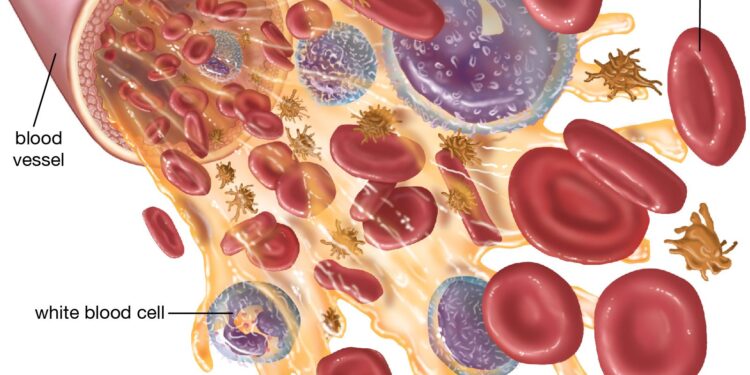The human immune system is a fascinating and complex network of cells, tissues, and organs that work tirelessly to protect the body from harmful invaders. Among the most vital components of this system are white blood cells (WBCs), also known as leukocytes. These cells act as defenders, constantly surveilling the body for infections, toxins, and other foreign substances. Their ability to identify, attack, and destroy pathogens makes them essential for survival.
What Are White Blood Cells?
White blood cells are specialized cells produced primarily in the bone marrow, and they make up less than 1% of the blood. Unlike red blood cells, which transport oxygen, or platelets, which help with clotting, white blood cells are dedicated to defense.
There are typically between 4,000 to 11,000 white blood cells per microliter of blood in a healthy adult. When the body detects an infection or injury, this number can rise significantly as the immune system mobilizes to fight back.
The Main Types of White Blood Cells
White blood cells are not a single, uniform cell type. They come in several forms, each with a specialized role in immunity:
1. Neutrophils
- The most abundant type of it.
- They are the first responders to bacterial and fungal infections.
- Neutrophils act by engulfing and destroying pathogens in a process called phagocytosis.
- For example, when bacteria like E. coli invade the body, neutrophils swarm to the site and neutralize the threat.
2. Lymphocytes
- Lymphocytes include B cells, T cells, and natural killer (NK) cells.
- B cells produce antibodies that recognize and neutralize pathogens.
- T cells coordinate immune responses and kill infected host cells.
- NK cells destroy cells that are infected or cancerous.
3. Monocytes
- Monocytes circulate in the blood and then migrate into tissues to become macrophages or dendritic cells.
- They play a crucial role in cleaning up dead cells and presenting pathogen fragments to other immune cells to trigger a stronger response.
4. Eosinophils
- Primarily involved in fighting parasitic infections.
- They also play a role in allergic reactions and asthma.
5. Basophils
- The least common white blood cells.
- They release histamine and other chemicals during allergic reactions and inflammation.
How White Blood Cells Protect the Body
The immune response involving it can be broken down into three main functions:
- Surveillance
It constantly patrol the bloodstream and tissues, searching for anything that doesn’t belong. - Recognition and Attack
Once a pathogen is identified, specific white blood cells launch an attack either by directly killing invaders, producing antibodies, or signaling other immune cells to respond. - Memory Formation
After an infection, some white blood cells remain in the body as “memory cells.” These allow the immune system to respond faster and more effectively if the same pathogen tries to invade again.
White Blood Cells and Infections
When pathogens like bacteria, viruses, or fungi invade the body, It acts as the frontline soldiers. For instance, during bacterial infections such as pneumonia, urinary tract infections, or meningitis, neutrophils and macrophages rush to the site to engulf and destroy the bacteria.
In some cases, however, the infection may overwhelm the body’s natural defenses. That is where antibiotics come into play. One widely used antibiotic in clinical practice is ceftriaxone injection, a third-generation cephalosporin.
How White Blood Cells and Ceftriaxone Work Together
While white blood cells naturally attack and destroy bacteria, ceftriaxone injection enhances this process by directly targeting bacterial cell walls, preventing the bacteria from multiplying. This makes it easier for the immune system to eliminate the remaining pathogens.
Doctors often prescribe ceftriaxone injections for severe infections such as:
- Sepsis
- Pneumonia
- Meningitis
- Skin and soft tissue infections
- Urinary tract infections
Because ceftriaxone is administered via injection, it quickly reaches therapeutic levels in the bloodstream, complementing the immune system’s natural defense mechanisms.
Why a Reliable Ceftriaxone Injection Supplier Matters
Access to quality antibiotics is critical in managing infections, especially in hospitals where patients are more vulnerable. A trusted ceftriaxone injection supplier ensures that
- The medication is produced according to strict safety and quality standards.
- Healthcare providers receive consistent and effective dosages.
- Counterfeit or substandard antibiotics, which can worsen antibiotic resistance, are avoided.
Pharmaceutical distributors and healthcare systems around the world rely on dependable ceftriaxone injection suppliers to keep patients safe and ensure effective treatment outcomes.
Disorders of White Blood Cells
While It is essential, problems can arise when they are too few, too many, or malfunctioning:
- Leukopenia: A dangerously low white blood cell count, making the body prone to infections.
- Leukocytosis: An abnormally high white blood cell count, often a sign of infection, inflammation, or even leukemia.
- Autoimmune disorders: When It mistakenly attack the body’s own tissues, as seen in lupus or rheumatoid arthritis.
In these cases, medical treatment and monitoring become necessary. Sometimes antibiotics like ceftriaxone are used to treat opportunistic infections in immunocompromised patients.
Strengthening Your White Blood Cells Naturally
While medications such as ceftriaxone injection are crucial in fighting serious bacterial infections, supporting your immune system through lifestyle is equally important. Steps you can take include:
- Eating a balanced diet rich in vitamins and minerals.
- Getting enough sleep to allow the body to regenerate immune cells.
- Exercising regularly to improve circulation of white blood cells.
- Reducing stress, which can weaken immune function.
- Practicing good hygiene to reduce exposure to pathogens.
Conclusion
White blood cells are the guardians of your immune system. From neutrophils fighting bacteria to lymphocytes building long-term immunity, these tiny but powerful cells keep us alive and healthy. However, when infections overwhelm the immune system, medical treatments like ceftriaxone injection step in to provide additional support.
That is why the role of a trustworthy ceftriaxone injection supplier is critical in modern healthcare. By ensuring access to high-quality antibiotics, healthcare providers can work hand in hand with the body’s own defenders the white blood cells to save lives.
Ultimately, maintaining a healthy immune system through good lifestyle choices, combined with timely medical interventions when needed, creates the best defense against infections. White blood cells may be small, but they play a massive role in the ongoing battle to keep our bodies safe.















